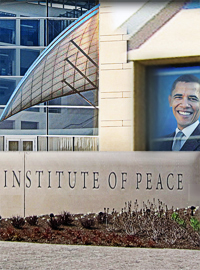| Obama on Iran: A Dove in Hawk’s Clothing |
 |
|
By Troy Senik
Thursday, March 08 2012 |
Based on the media’s reaction, you would think that Barack Obama has discovered his inner Theodore Roosevelt in the last week. A recent Wall Street Journal editorial proclaimed, “As White House U-turns go, President Obama's hawkish rhetorical shift on Iran in the last week has been remarkable.” Fox News, similarly breathless, reported in an online piece, “Obama is delivering saber-rattling speeches at AIPAC and using cowboy talk about Iran that would have made George W. Bush blush.” The predicate for this sudden reappraisal of the calcium content of the president’s spine was a raft of public statements timed to coincide with the White House visit of Israeli Prime Minister Benjamin Netanyahu and the aforementioned AIPAC Conference, where supporters of Israel gathered together in Washington. The kickoff for Obama’s full-court press was an interview with the Atlantic’s Jeffrey Goldberg published on March 2. Obama came to that discussion loaded for bear with pro-Israel talking points. He rejected the idea of a policy of “containment” towards Iran, a principle he expressed even more explicitly in his speech to AIPAC a few days later. He said, “We in the United States instinctively sympathize with Israel.” And he cautioned that a nuclear Iran is “unacceptable,” reaffirming his commitment that “all options are on the table” with regard to Iran by warning, “as president of the United States, I don't bluff.” This at least represents an improvement on the president’s use of poker metaphors – during the impasse over the debt ceiling he told House Majority Leader Eric Cantor “don’t call my bluff.” Scratch just beneath the surface of those superficial expressions of resolve, however, and you’ll find a president still mired in a deep and abiding intellectual confusion. In the sit-down with the Atlantic, Goldberg asked Obama whether there was anything he could do to hasten Syria’s transition to a peaceful, democratic regime. Obama’s response: “This is part of, by the way, the context in which we have to examine our approach toward Iran, because at a time when there is not a lot of sympathy for Iran and its only real ally is on the ropes, do we want a distraction in which suddenly Iran can portray itself as a victim?” Words fail. The president’s statement amounts to a de facto subordination of American national security interests to the public relations strategies of our enemies. Because this is not the first time that Obama has employed this rationale, we already have real world evidence of its failings. In the summer of 2009, as opponents of the mullahs’ regime filled the streets of Iran, President Obama reacted to criticism of his failure to speak out in the protesters’ defense by pronouncing, “The last thing that I want to do is to have the United States be a foil for those forces inside Iran who would love nothing better than to make this an argument about the United States.” Despite his protestations, however, the Iranian regime was all too happy to repeatedly pin the blame for the political turbulence on Western meddling. Dictators, it turns out, are not prone to extensive annotation when it comes to their propaganda. Even if the U.S. could effectively alter the content of Iranian state rhetoric, it would be of trifling importance; the only people whose minds could possibly be changed as a result would be those who take the party line from Tehran at face value – a group beyond intellectual redemption. But since even that modest achievement is out of reach, pinning the nation’s strategic decision-making on it is foolish in the extreme. At a White House press conference on Tuesday, Obama made explicit what the “victim” caveat had only hinted at: that his support for Israel is a rhetorical mile wide and a substantive inch deep. Asked to define what he meant when he decreed earlier this week – in regrettably pedestrian fashion – that “the United States will always have Israel’s back,” Obama responded, “It was not a military doctrine that we were laying out for any particular military action. It was a restatement of our consistent position that the security of Israel is something I deeply care about…” So the full measure of the president’s commitment to Israel is how deeply he feels about them? That’s sure to bring comfort under the roofs of Jerusalem, where Israeli citizens can sleep peacefully knowing that, should Iran go nuclear, the President of the United States will be right there to embroider a pillow for them. Obama closed his remarks to AIPAC by telling the audience, “There is no shortage of speeches on the friendship between the United States and Israel. But I’m also mindful of the proverb, ‘A man is judged by his deeds, not his words.’ So if you want to know where my heart lies, look no further than what I have done - to stand up for Israel; to secure both of our countries and to see that the rough waters of our time lead to a peaceful and prosperous shore.” Seemingly bereft of any sense of irony, he chose to end the speech there, rather than offering any examples. The proverb, alas, had it right. |
Related Articles : |
























